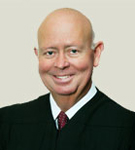About Us
Message From President Judge Vaughn Fiscal Year 2012

Superior Court Annual Report for Fiscal Year 2012
In February, FY12, Superior Court welcomed its new Chief Staff Attorney, Linda M. Carmichael, who was formerly with the Department of Justice. In addition to her responsibilities to the President Judge and the other judges in all three counties, Ms. Carmichael is also a part of the Judiciary's Legislative team.
In Kent County, a chain reaction in administration occurred. Joe Klenoski retired as the Court's Deputy Court Administrator on March 3, 2012. On April 11, Lisa M. Robinson, former Prothonotary, was appointed as the Deputy Court Administrator. Annette Ashley, former Deputy Prothonotary, was appointed to the position of Prothonotary on June 14.
June 14, was the one‑year mark for the grand opening of the Kent County Courthouse. The new courthouse seems like home now. The renovations to the old Courthouse should be completed by FY13, and we look forward to the opening of our renovated old courthouse. This year, Sussex County Courthouse completed its project to cover the jurors' entrance to the courthouse. Jurors are now protected from the elements as they file into the building. Dry jurors are happier jurors.
At the New Castle County Courthouse (NCCCH), Superior Court added to its complement of high-tech courtrooms. There are now nine high‑tech courtrooms, and seven remain to be updated in the future. A space study for all the courts in the NCCCH was undertaken this year. All the courts have been involved in the planning, and we all look forward to having more workspace and courtrooms.
The workload in both criminal and civil has shifted somewhat this year. On the criminal side, our problem‑solving courts have been in the spotlight and, in some instances, have become the standard for such courts. We are very proud of our problem solving courts, and they are proving to be successful in meeting very real needs in the community. Our four problem‑solving courts are Drug Court, Mental Health Court, Reentry Court, and Veteran's Court.
The focus of these courts centers on the work and time our judges, staff, and volunteers devote to help people with special needs. These are people caught up in the criminal justice system because they have problems that were not getting treatment. As a result, their rate of recidivism was high. The goals of problem solving courts are to take these people out of the system, to reduce cycle of recidivism, and to increase the help needed to get them re‑acclimated into society. Assistance is available to help to find them places to work, somewhere to live, and give support systems to help sustain them.
Our civil side has seen a shift in our workload as well. On September 21, 2011, Governor Markell signed House Substitute 1 for House Bill 58 which established the Automatic Residential Mortgage Foreclosure Mediation Program (the Mediation Program). The Superior Court first established a Mortgage Foreclosure Program pursuant to Administrative Directive 2009‑3. That original Mortgage Foreclosure Program was modified by Administrative Directive 2011‑2, which was subsequently expanded by the passage of House Substitute 1 for House Bill 58. The present Mediation Program is set forth in Administrative Directive 2012‑2.
The goal of the Mediation Program is to encourage the parties to a foreclosure action to meet and consider a possible resolution which may permit the homeowner to continue to own the home. Unlike the previous mortgage foreclosure programs which were voluntary, participation in the Mediation Program is mandatory. The Mediation Program is applicable to most residential mortgage foreclosure actions filed from January 19, 2012 through January 18, 2014.
Mediations scheduled for FY 2012 under the 2009‑3 Directive (filed prior to January 19, 2012) totaled 352. Mediations filed January 19, 2012 through June 30, 2012, under the new 2012‑2 Directive, totaled 45.
In 1991, Superior Court was the first state court in the nation to implement electronic filing. Effective May 1, 2012, Administrative Directive No. 2012‑3 was made to expand the use of civil e-Filing to some cases filed as Miscellaneous Civil. This Administrative Directive rescinded and replaced Administrative Directive 2011‑6.
Project Rightful Owner, which began in 2007, is still in action. Twenty‑two orders were processed, and $379,634.75 was disbursed to those who lost their homes to mortgage foreclosure. In our Complex Commercial Litigation Division (CCLD), 42 cases were filed, 36 disposed of, and 53 were pending. These cases may be assigned when the controversy is one million dollars or greater, involves an exclusive choice of court agreement, or is designated by the President Judge.
Statewide case statistics for FY12 civil cases numbered 12,490 filings; 14,423 dispositions; and 8,525 pending. Criminal cases came in at 8,816 filings; 8,223 dispositions, and 1,683 pending. The decrease in civil filings appears to be the result of fewer judgments being filed. There was a slight increase this year in criminal filings and in dispositions. By the end of the fiscal year, statewide, 38 murder first cases were filed, and 27 were pending. This totals 65 potential capital murder trials for the court. Statewide Violation of Probation (VOP) cases filed were 5,384; 4,468 were disposed of, and 694 were pending.
The Superior Court website, after last year's complete redesign and major functionality changes, optimized the site for quicker load response access in FY12. segments newly designed include Judicial Officers, Jury Service, Governance, Problem‑Solving Courts, CCLD, About Us, and iCourtClerk™. Our ListServ now includes 2,754 members, and maintains 19 separate Listservs. The public service provided over 126 instant notifications to our users. The Court's Intranet is a source of information for court employees. The most anticipated Intranet item is the Court's on-line news letter, Hearsay.
Superior Court employees are its best asset, and they strive to fulfill the Court's vision of superior service to the public‑those in pursuit of Justice. Our judges and staff work hard to adhere to the Supreme Court Speedy Trial Standards for criminal cases and to follow the Court's Civil Case Management Plan to move civil cases to expedite resolution. Our core values of Unity, Neutrality, Integrity, Timeliness, Equality, and Dedication unite us as a Court and unite us as part of a Judiciary that strives for excellence.
— President Judge James T. Vaughn Jr. —


